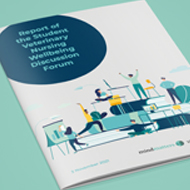Report highlights wellbeing concerns of student VNs

“We’re really pleased that so many people attended our Wellbeing Forum and engaged with the discussion sessions” - Lisa Quigley.
A new report highlighting key discussions from the recent Student Veterinary Nurse (SVN) Wellbeing Discussion Forum has been published by the Mind Matters Initiative and VN Futures.
Some 650 student SVNs recently qualified veterinary nurses and clinical coaches attended the Discussion Forum, which was based around four key survey results impacting the mental wellbeing of the profession, including incivility and bullying, juggling demands, disability and chronic illness, and awareness, recognition and pride.
Of those that responded to the survey, 96 per cent of people felt that bullying and incivility are serious problems within the profession and that many of the bullying accounts involved people in senior positions acting poorly towards people in more junior roles.
Many respondents also said the demands of their work were affecting their wellbeing, with some individuals saying they didn’t even have time to eat or use the toilet when they were at work. Around 81 per cent of respondents said that they found their job stressful.
On disability and chronic illness, one in three respondents identified as having a disability or chronic illness and one in five as neurodiverse. Respondents with disabilities and/or chronic illnesses said they were often made to feel like a burden, especially when requesting to shield during the COVID-19 pandemic.
A high proportion of respondents said they had felt they had chosen the right career and were passionate about caring for the animals in their care. However, low pay and lack of respect from vets and the public were highlighted as recurring issues within the role.
Among those in attendance at the Discussion Forum were Mind Matters Initiative manager, Lisa Quigley, and BVNA president Alexandra Taylor. Ms Taylor outlined the challenges people with disabilities and chronic illnesses face and what the veterinary profession can do to support their staff.
Dr Simon Fleming, an NHS trauma and orthopaedic registrar, explained the impact that bullying can have on the person being bullied and those who witness it. RVN Jane Davidson spoke about setting healthy boundaries and how these can be applied in the vet nursing role.
Attendees were then invited to join breakout discussion sessions to discuss their experiences and how they feel the profession could improve the mental wellbeing of vet nurses. The key outcomes from those discussions were:
- more needed to be done to make it clear that the MMI is for the whole veterinary profession, not just vet surgeons.
- there needed to be additional resources and training to educate employers and the wider veterinary professions about the legal rights for people with a chronic illness and/or disability in the workplace and their expectations in terms of reasonable adjustments.
- training needed to be given to help people understand how to address bullying in the workplace and that this should be given as early as their initial veterinary training.
- some students said they would not feel comfortable challenging a senior member of staff and said that they would benefit from having training in how to address the behaviour of someone in a senior position.
- there needed to be a change in the culture around taking breaks and that staff should be actively encouraged to switch off during their break times.
“We’re really pleased that so many people attended our Wellbeing Forum and engaged with the discussion sessions,” commented Lisa Quigley, Mind Matters Initiative Manager. “Throughout the discussions, some people shared difficult and personal experiences and we want to thank everyone for being so open and for being respectful to those who shared their stories.”
She added that student and veterinary nurse wellbeing will be key components of the 2022- 2027 MMI strategy, which we will be launching in the spring.
“The forum discussions, survey results and feedback from the student vet nursing community will be incorporated into the survey and guide the resources, research and support we work on to help improve the mental wellbeing of the profession,” she said.



 The Federation of Independent Veterinary Practices (FIVP) has announced a third season of its podcast, Practice Matters.
The Federation of Independent Veterinary Practices (FIVP) has announced a third season of its podcast, Practice Matters.